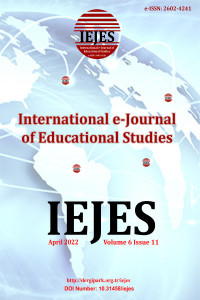Continuous Assessment in Malawian Primary Schools: An Effective Policy on Paper
Continuous assessment, outcome-based education, continuous testing
Continuous Assessment in Malawian Primary Schools: An Effective Policy on Paper
___
- Calderhead Teacher, J. & Shorrock, S.B. (1997). Understanding teacher education. London: The Falmer Press.
- Chakwera, E., Khembo, D., & Sireci, S.. (2004). High-stakes testing in the warm heart of Africa: The challenges and successes of the Malawi national examinations analysis archives. Retrieved [20th October 2021] from http://epaa.asu.edu/epaa/v12n29
- Chiziwa, W. K.M.C., & Kunkwenzu, E. D. (2022). Feedback amidst new assessment culture in Malawian primary schools. Open Journal of Social Sciences, 10, 100-116. https://doi.org/10.4236/jss.2022.101008
- Chiziwa, W. K.M.C., & Kunkwenzu, E. D. (2021). Investigating teacher assessment practices in the teaching of social studies in Malawian primary schools. Open Journal of Social Sciences, 9, 480-495. https://doi.org/10.4236/jss.2021.97035
- Chulu, B. W. (2013). Institutionalisation of assessment capacity in developing nations: the case of Malawi. Assessment in Education: Principles, Policy & Practice, 20(4), 407-423. http://doi.org/10.1080/0969594X.2013.843505
- Fautly, M. & Savage, J. (2008). Assessment for learning and teaching in secondary schools. 33 Southern hay East: Learning Matters Ltd.
- James, M. (2006). Assessment teaching and theories of learning. In Assessment and learning. Gardner, J. (Ed). London: SAGE Publications. Ltd 51-60.
- Kaambankadzanja, D. (2005, April). The primary curriculum and assessment reform (PCAR): The process, the challenges and the way forward. Paper presented at National Education Conference. March 29- April 1.
- Kivunja, C. (2015). Why students don’t like assessment and how to change their perceptions in 21st century pedagogies. Creative Education, 6, 2117-2126. http://doi.org/10.4236/ce.2015.620215
- Mchazime, H. (2003). ‘Integrating primary school curriculum and continuous assessment in Malawi’, Improving Educational Quality Report [online]. Available at: http://edumalawi.cc.ac.mw/jspui/bitstream/123456789/126/1/Intergrating%20continuous%20assessmnet%20into%20the%20Primary%20School%20Curriculum%20in%20Malawi.pdf (Accessed: 10th November 2016)
- MoE. (2020). National education sector investment plan 2020-2030. Lilongwe: Ministry of Education.
- MoEST. (2014). Orientation manual for junior secondary school curriculum generic issues. Lilongwe: MoEST.
- MoEST. (2015). National education standards, primary and secondary education. Lilongwe: Ministry of Education Science and Technology
- Sadler, D.R. (1989). Formative assessment and the design of instructional systems. Instructional Science. 18(2), 119–144.
- Shepard, L.A. (2009). The role of assessment in learning culture. The Journal of Education. 189(1)
- Susuwele-Banda, W.J. (2005). Classroom assessment in Malawi: teachers’ perceptions and practices in mathematics. Unpublished Doctoral Thesis: Virginia Polytechnic Institute and State University.
- Vu, T. T., & Dall’Alba, G. (2007). Students’ experience of peer assessment in a professional course. Assessment and Evaluation in Higher Education, 32, 541-556. https://doi.org/10.1080/02602930601116896
- Başlangıç: 2017
- Yayıncı: Tamer KUTLUCA
Agrippa Madoda DWANGU, Vimbi MAHLANGU
Tavonga TAWANDA, Awelani V MUDAU
Information Processing Ability and its Implications for Teaching and Learning
Mariette FOURİE, Gawie SCHLEBUSCH
Yeter DURGUN OZAN, Mesude DUMAN, Gözde GÖKÇE İŞBİR
Lebelo DİMAKSTSO, Alfred MODİSE, Ngobeni THEMABA
Reflections on the Integration of Environmental Education by a Primary School Teacher
Continuous Assessment in Malawian Primary Schools: An Effective Policy on Paper
Hülya ASLAN EFE, Sadreddin TUSUN, Ali Osman ALAKUŞ, Rıfat EFE
The Difficulties and Educational Stress of Nursing Students in Clinical Practice during the Covid
Esma AKGÜL, Canan BİRİMOĞLU OKUYAN, Filiz POLAT
Comparison of 5th to 8th Grade Mathematics Curricula in Turkey and Greece
